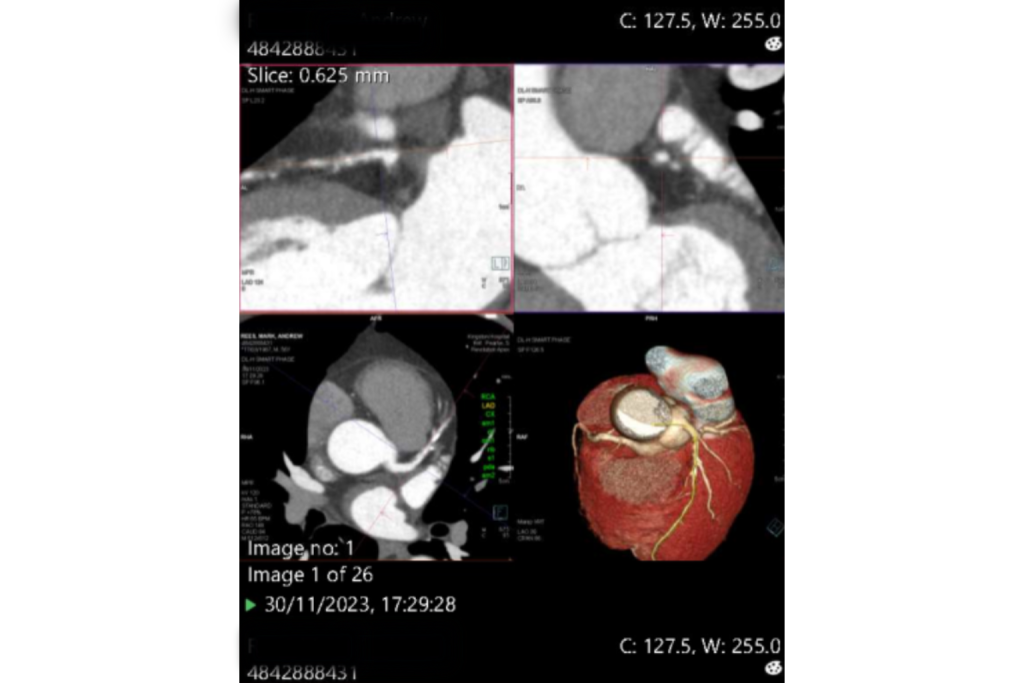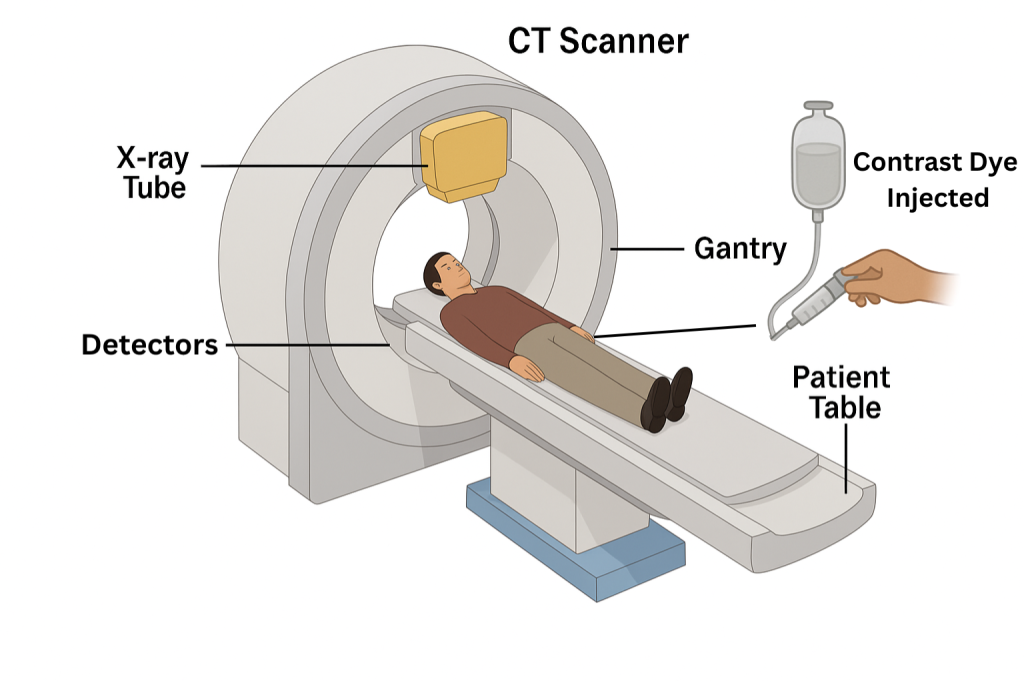A CT coronary angiogram is a special type of heart scan. It uses a CT scanner to take detailed pictures of your heart and its blood vessels.
Simple carousel diagram to show the CT coronary angiogram procedure.
The pictures are taken after a dye called contrast is injected into your bloodstream, which makes the arteries show up clearly. Doctors use this test to check for problems with the heart’s blood vessels, called the coronary arteries. These arteries carry blood to the heart muscle. If they become narrowed or blocked, it can lead to chest pain or increase the risk of a heart attack.
A CT coronary angiogram can show if your coronary arteries are narrowed, blocked, or have a build-up of fatty deposits called plaque. It can also reveal other heart problems, such as unusual artery shapes or signs of injury.
The images give doctors a clear view of how blood is flowing to your heart. This information helps them decide if treatment is needed, such as lifestyle changes, medication, or further procedures.

Actual results of a CTCA scan for a male.
Yes. A CT coronary angiogram is often used to check for signs of coronary artery disease. This is when the arteries supplying blood to the heart become narrowed due to plaque build-up.
By showing how open or blocked the arteries are, the scan can help doctors decide whether you might benefit from treatments like medicines to lower cholesterol or, in more severe cases, surgery or stents to improve blood flow.
The scan is done in a hospital radiology department. First, you are given an injection of contrast dye, usually into a vein in your arm. The dye travels through your bloodstream and makes the coronary arteries show clearly on the scan.
You will lie on a table that moves slowly through the CT scanner, which is shaped like a large ring. The scanner uses X-rays to take detailed cross-section images of your heart and blood vessels from different angles. A computer then combines these into a full 3D picture.
Sometimes, you may be given medicine before the scan to slow your heart rate. This helps the images come out clearer.

For most people, a CT coronary angiogram is safe. The scan does involve a small amount of radiation, similar to other CT scans, but the benefits of detecting heart problems often outweigh the risks.
The contrast dye is safe for most people but can rarely cause allergic reactions. People with kidney problems may need extra checks before having the dye. Pregnant women are usually advised to avoid this scan unless it is urgently needed.
Does it hurt?
No, the scan is painless. You may feel a cool sensation when the dye is injected, and the table might feel a little firm, but the process is comfortable for most people.
Do I need to stay in hospital afterwards?
No, you can usually go home the same day. If you’ve had medication to slow your heart rate, you might need to rest for a short time before leaving.
How long does it take?
The scan itself takes only a few minutes, but you may be in the department for 30–60 minutes to prepare and have your heart rate checked.
Once the scan is complete, a radiologist — a doctor who specialises in medical images — will look at the pictures and write a report. The report is sent to your cardiologist or the doctor who referred you.
Your doctor will discuss the results with you. If narrowing or blockages are found, they will explain your treatment options. This could include lifestyle advice, medicines, or further tests such as an invasive coronary angiogram.
Price difference between a CTCA scan and an invasive Angiogram scan.
Sources: Heartsure, KIM’s Hospital
In the UK, CT coronary angiograms are available on the NHS if your doctor thinks you need one. The NHS covers the cost, but waiting times can vary depending on your local hospital and how urgent your case is.
Private healthcare can sometimes offer quicker appointments and more flexibility in choosing when and where you have the scan, but you will need to pay for it or use private medical insurance.
Average wait times for patients to have an CTCA scan in the UK (NHS vs. Private)
Sources: NHS
Most people do not need this scan regularly. It is usually done when there is a medical reason, such as chest pain, abnormal heart test results, or a high risk of coronary artery disease. Your doctor will decide if and when you need one based on your symptoms and health history.
Routine scanning without symptoms is not generally recommended because it involves radiation and contrast dye, and the benefits are small if you have no signs of heart disease.
You may be referred for a CT coronary angiogram if:
You have chest pain that could be related to heart problems.
Other tests, like an ECG or exercise test, show changes that suggest heart disease.
You have a strong family history of early heart problems.
You have high risk factors, such as high blood pressure, diabetes, high cholesterol, or smoking.
Your doctor will weigh your personal risk and decide if the scan is the best next step.
Yes. In some cases, other tests can provide similar information. These include:
Invasive coronary angiogram — where a thin tube is inserted into the blood vessels and dye is injected directly into the heart arteries. This gives very clear images but is a minor surgical procedure.
Stress tests — such as an exercise ECG, which show how your heart works under strain.
Echocardiogram — an ultrasound of the heart that can show how well it is pumping.
Each test has its own advantages and risks. Your doctor will choose the one that gives the clearest answer for your situation.
A CT coronary angiogram is a scan that uses X-rays and contrast dye to show detailed pictures of the heart’s blood vessels. It helps doctors see if the arteries are narrowed or blocked, which can be a sign of heart disease. The scan is safe for most people, quick to perform, and usually done when there is a clear medical reason.
Whether you have it on the NHS or privately, the decision should be made with your doctor, based on your symptoms, risk factors, and overall health. It’s one of the most useful tools for diagnosing problems with the heart’s blood supply without needing surgery.
Disclaimer: Seonat provides general health information for educational purposes only. This content is not a substitute for professional medical advice, diagnosis, or treatment. Always seek the advice of your GP or another qualified health provider with any questions about a medical condition or before making health decisions.

Simplifying health information for those who need it most
Please note: we are not medical professionals, and the content on this website is for general information only. Always speak to a qualified healthcare provider for medical advice.